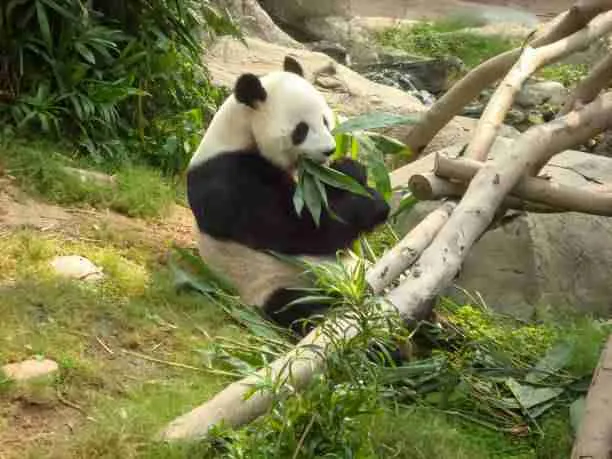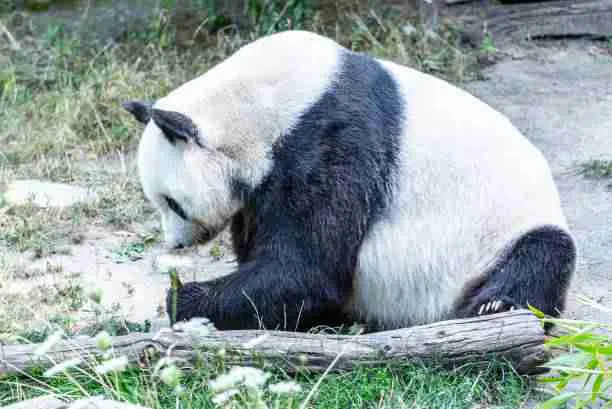Giant pandas are considered to be primarily herbivores. They feed mainly on many parts of the bamboo. But If all they eat is bamboo, then how come these creatures are fat?
A certain form of gut bacteria known as Clostridium butyricum makes the giant pandas fat. Scientists believe that this gut bacteria helps take part in “crosstalk” in the giant panda’s metabolism.
This way, they can easily gain weight and store fat using bamboo stems and shoots.
This bacteria helps the giant panda’s health during the period bamboo shoots become scarce. It also supports the giant pandas when they feed on bamboo leaves alone.
Clostridium butyricum is a form of gut bacteria that also live in human beings. It serves as a cure for many inflammatory bowel deficiencies and extreme cases of diarrhea.
Now, you know why giant pandas gain so much weight despite their bamboo diet.
Let us look into the reason why they stay fat in detail.
Table of Contents
- 2 Reasons Why Giant Pandas Are Fat
- Benefits of Being “Fat”
- The Ideal Weight Giant Pandas
- Related Questions
- Conclusion
2 Reasons Why Giant Pandas Are Fat
1. A Shift in Diet

Giant pandas eat bamboo leaves for more than eight months of the year. However, their diet changes between late spring and summer.
They start to feed on fibrous shoots. These contain lots of cellulose and hemicellulose.
A study shows that a slight shift in their diet causes them to be chubby. By feeding on lots of fibrous shoots during summer and spring, they store up enough fats in their body.
The bodyweight of the giant pandas is found to be higher in the periods they feed on shoots than leaves.
2. Seasonal Change in Gut Bacteria
Although giant pandas exclusively feed on fibrous shoots, they still manage to gain weight. A study on the eating habits of giant pandas revealed a change in the seasonal gut bacteria of the pandas.
Scientists have discovered that at the time of the year when healthy bamboo shoots are available in large quantities, their gut bacteria change too.
The shift in the giant panda’s gut bacteria helps them store enough nutrients and become fat. It also makes up for the low nutrient content of the period they feed on bamboo leaves alone.
Giant pandas need to feed on an average of 25 lbs to 185 lbs (11kg to 83kg) of bamboo daily. However, this depends on the part of bamboo they decide to feed on.
Benefits of Being “Fat”
Now, you must be wondering what are the benefits of giant pandas being fat.
Here at 2 benefits:
- Their fat nature makes them not feel any pain after falling. Giant pandas always fall off trees. This happens either when they are resting or playing.
- Being fat helps giant pandas to regulate temperature.
The Ideal Weight Giant Pandas
A mature male panda weighs about 175 lbs (79kg) to 300 lbs (136kg). The male pandas weigh much more than their female counterparts.
This difference in body weight between the different panda genders is due to biological variations.
On the other hand, female pandas have been found to weigh 155 lbs (70kg) to 200 lbs (94kg). However, a panda cub only weighs about 0.22 lbs (0.1kg).
As the panda cubs grow older, they increase in size and weight.
When they reach one year, their weight is usually up to 90 lbs (45kg).
Related Questions
Are Pandas Always Fat?

Yes, giant pandas are always fat. However, the number of fibrous shoots they feed on is responsible for making them fat.
Young and newly born pandas weigh very little. The females increase to 90 kg as they grow older. Meanwhile, their male counterparts weigh 136 kg.
However, between late spring and summer, giant pandas feed on lots of fibrous shoots. These shoots contain large amounts of nutrients like hemicellulose and cellulose. This is the period they become fat.
Moreover, most of their trees.
Their fat cheeks which make them look cute are muscles. With these, they chew on tough bamboo stems
Interestingly, giant pandas are quite soft and flexible. This is in contrast to thoughts that they are fat and strong.
Overweight Pandas In Captivity – What to Do?
Pandas can get overweight, especially if they eat lots of bamboos.
It is either they feed on the shoots or leaves. If care is not taken, they will likely eat more bamboo than their system can contain and get overweight.
Here’s how zookeepers help giant pandas:
1. Exercise regularly
An overweight giant panda will have to exercise regularly. The zookeepers are responsible for ensuring the panda exercises their body. They can start by engaging in activities like exercise and games.
This way, they get to lose some body fat and stay fit.
2. Follow a strict diet
If not correctly cared for, an overweight panda might develop serious health issues like diabetes.
To avoid these and other health problems, the pandas will have to follow a diet.
This diet includes food with high protein content and is low in fat, sugar, and salt. Also, pandas are placed on a special diet to lose weight.
This particular diet contains condensed corn and bread, and soya beans.
How Do Giant Pandas Get Fat From Bamboo?

Giant pandas feed on 25 Ibs. (11kg) to 185 lbs (83kg) of bamboo daily. However, there is a switch in the giant panda’s gut bacteria between late spring and summer.
They start to feed mainly on bamboo shoots instead of the usual bamboo leaves. This makes the giant pandas fat.
The reason is that nourishing bamboo shoots are available in large quantities. Therefore, they are easy to find and eat.
Before this, giant pandas have an inefficient digestive system. They eat large amounts of bamboo leaves to stay fit and healthy. However, this doesn’t make them fat.
Conclusion
In summary, giant pandas are fat because a certain bacteria Clostridium butyricum in their digestive metabolism makes them fat.
There is a change in the diet of the giant pandas. They start to feed on bamboo shoots instead of leaves. These shoots contain large nutrient content which makes the giant pandas fat.
Also, they experience a change in the gut bacteria of the pandas. This change helps them to store up fats in their body.
I hope this article was helpful. Don’t forget to share with your friends!

